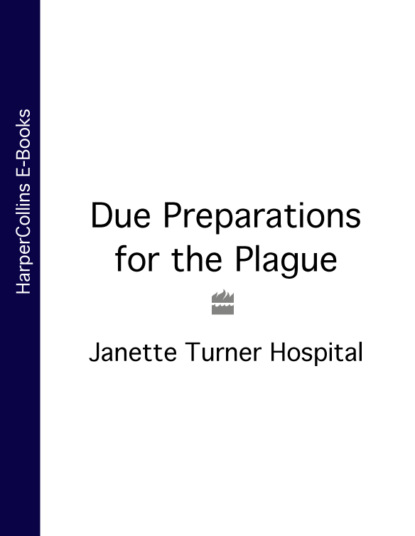По всем вопросам обращайтесь на: info@litportal.ru
(©) 2003-2024.
✖
Due Preparations for the Plague
Автор
Год написания книги
2019
Настройки чтения
Размер шрифта
Высота строк
Поля
FOG (#ulink_b637b961-cabb-5eb3-a2fd-df472d01fae9)
Fear death? To feel the fog in my throat,
the mist in my face …
Robert Browning
1. Salamander (#ulink_2cdb1408-5914-5e66-b19c-7c26ef0c1e90)
I spy.
With my manifold eye.
This is Salamander’s morning canticle.
He leans in close to the bathroom mirror and his words come back lush, fully orchestrated, thick with toothpaste and shower fog. He squints and sees galaxies: bright floating points, moons, multiple planetary rings. He has the eyes of a fly or a god. The things that he knows, weighty matters of life and death—not natural death, or swift death—orbit his consciousness, but he must not speak of them.
This is the way Samantha imagines him. She has constructed him, like a trick question, from undeleted half lines in documents. Morning exhausts him, she imagines. His eyes, in the bathroom mirror, would be bloodshot. Dreams, dispersing though still opaque, would cloud the room. He would not recall the dreams, though they would leave a layer of unease that he would scrub at under the shower and slough off.
In the trade, and to those who do research in previously classified files, he is known as Salamander, or S, and that—for the time being, and to Samantha’s chagrin—will have to suffice.
Salamander: a mythical creature having the power to endure fire without harm; an elemental being inhabiting flames in the theory of Paracelsus; any of numerous amphibians superficially resembling lizards but scaleless and covered with a soft moist skin and breathing by gills in the larval stage.
He is all of the above, Samantha believes, closing the dictionary. She imagines him in front of his bathroom mirror. He would watch himself without blinking as reptiles do.
Unobtrusive, soft as a snake, he slithers under and around many lives. Around Samantha’s life. Around Lowell’s. Around yours. Around mine. We deposit data ceaselessly. He gathers it: phone conversations, e-mails, airline tickets, credit card purchases, income and taxation information, websites visited, buying habits, tastes and eccentricities. He has photographs: from banks, retail stores, elevators, public bathrooms, pedestrian crossings, parking lots, airports.
Those whom he chooses to observe are known to him intimately.
Their nerve systems are digitally mapped.
As flies to wanton boys are the chosen to Salamander.
When it pleases him, he nudges them in this direction or that, according to his game plan. He makes up the rules as he goes.
Samantha is one of his subjects. In the beginning, this was inadvertent, but then he became obsessed with her and she with him.
She deposits data. He gorges on it.
She studies the patterns of his gorging, and posits him.
She posits him because her own existence requires it. Her own existence? From day to day, it feels to her an uncertain thing, without stable landmarks or fixed signs. Some days, when she watches children playing in the park, she can feel the ground giving way. You have no idea, she wants to tell the children. The swings, the sandbox: they are all illusions. You have no idea how unreliable things are, or how suddenly the sky can turn to fire. The playground dips and sways in front of her. In fog everything shifts with the light, everything floats.
On other days, in her classes at Georgetown University, she looks around the seminar table at fellow students and thinks: We live on different planets.
She is nineteen years old, majoring in American history and government, but how could she even begin to translate her life, her inner life, so that it would be intelligible to her peers? They take safety for granted, she knows, and they are certain that two and two always make four, but this could change. She thinks of it this way: that we are composed of a frail string of learned sequences (we recognize our own face in a mirror, we know our own name, we can put on our shoes without thinking, we know how to make love, and we know what to do—more or less—when we feel acute physical pain), and these pieces which make up the puzzle of the self are held together by the glue of memory. Certain solvents can dissolve this glue: a stroke, catastrophic events. Then we are forced to become scavengers of our own past, searching, finding, relearning, reassembling the self.
Samantha tracks different threads of light, painstakingly, one by one, and she follows their beams into the haze. Here and there, little by little, events can be catalogued and flagged, and eventually she hopes she will be able to recalculate the unknown quantities of herself and of Salamander who made and unmade her. She constructs him from the traces he leaves in other lives. She puts him together like a jigsaw puzzle in order to explain what happened in September 1987 and how it happened and why.
She is mapping her way out of fog.
Look at Samantha: here she is, the day the world changed, on the border between Before and After, in fading color on Kodak paper. She is six years old. She is wearing a blue woolen coat with a darker blue velvet collar and a cotton dress (it is white, prinked with forget-me-nots, and has a smocked bodice and puffed sleeves; it is visible through her unbuttoned coat). She is also wearing white lace-edged socks and black patent-leather shoes. The sign above her head says PORTE 12 because this photograph was taken at Charles de Gaulle Airport in September 1987. Framed by the doorway to the boarding tunnel, she is turning back to wave. Her left hand clutches the hand of a young man, not a good-looking man, not particularly, but a man whose skin barely seems to contain him. Even in the photograph, an aura of intensity comes off him. The man is her father, Jonathan Raleigh. A one-armed teddy bear, once Samantha’s but given to her baby brother weeks earlier, dangles from her right hand, and when she waves, the teddy bear swoops about like a flag. She is laughing, and there is a dimple just to one side of her mouth. She can feel the fire passing from her father’s hand to her own. There are high mad notes in the pressure of his fingers, messages she is picking up but cannot translate. Her father is also laughing and waving. Beside him, a woman, perhaps weary, her smile slightly tense, holds baby Matthew up to the view of those who have come to see the family off.
“Your mother made your coat,” Samantha’s aunt tells her.
“She did?”
“She made all your clothes. She was that kind of mother.”
That kind of mother. Samantha saves this phrase. She saves every fragment, every splinter of information.
“The bodice of your dress was hand-smocked,” her aunt says. “These days, you have to go to a museum to see that sort of thing.”
“I still have the dress,” Samantha says.
“Your mother was not afraid of being old-fashioned.”
Sometimes at night, when Samantha cannot sleep, she takes the dress out of its tissue paper and holds it against her cheek, but it keeps its secrets. “It’s torn,” she tells her aunt. “There’s a rip in the skirt.”
“Yes. I remember.”
“From the hem right up to the smocking on the bodice. But it’s not torn in the photograph.”
“No.”
“It must have caught on something when they put us on the escape hatch.”
“Or later, perhaps,” her aunt says.
“I can’t remember tearing it.”
“We couldn’t get that coat off you, you even wanted to sleep in it.”
“I must have taken it off, though,” Samantha says. “Eventually. My mother must have talked me into it.” She studies the woman in the photograph—her mother, Rosalie Hamilton Raleigh—with a magnifying glass. Her mother is not much more than a girl, really, twenty-six years old, at the time of the photograph. “It must have been in the overhead locker.” Samantha thinks she can remember her father putting the coat there. Sometimes she can remember. It all depends on which way she tells the story to herself. “Perhaps during the first landing,” she says.
“Morocco,” her aunt says.
“We didn’t know where we were.”
“Morocco. Every landing is imprinted on my brain, up to the final one in Iraq. They kept showing us maps and flight paths on TV.”
For some reason, this makes Samantha feel giddy. The room tilts. She closes her eyes and grips the arm of the sofa because a curving hall of mirrors seems to be sloping away from her and at the far end, very tiny, she can almost see her mother with a baby in her arms.
“It was horrible,” her aunt says. “Just watching and watching, completely helpless. It was horrible.”
“Was it?” Samantha cannot keep an edge of anger from her voice, and something else too, a low buzz of excitement which her aunt detects and which Samantha will not let go. Like a terrier, she works at her aunt’s growing agitation. “Was it, Lou?” she needles. She never says Aunt Lou, only Lou. She watches her aunt the way a cat watches: tense, ready to pounce.
“Sam,” her aunt says. She sounds very tired. “I am not trying to compete. It goes without saying that it was far, far more horrible on the plane.”






